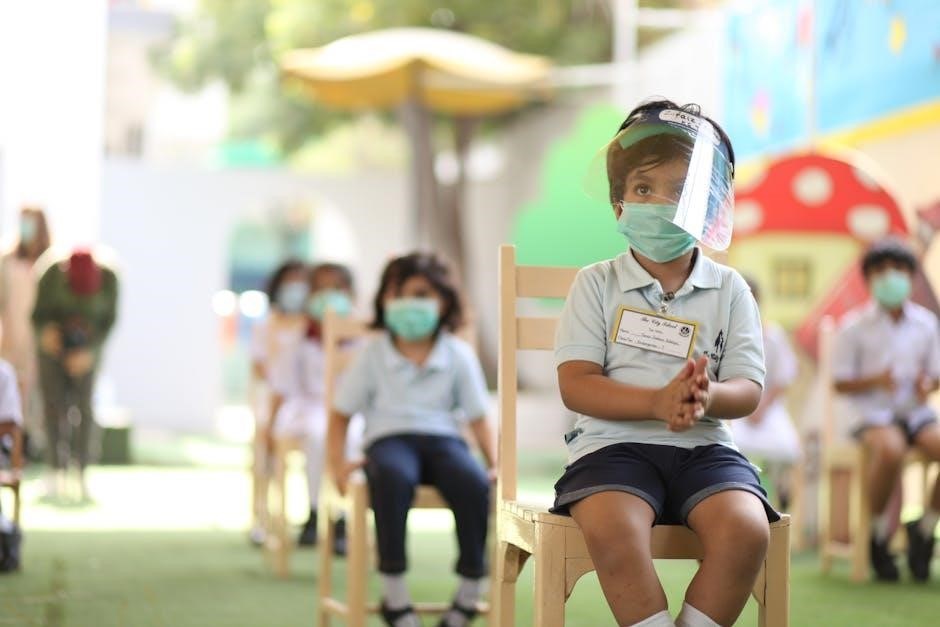A daycare sick policy ensures the health and safety of children, staff, and families by preventing the spread of illness and promoting a safe environment.
1.1 Overview of Daycare Sick Policy
A daycare sick policy outlines guidelines for managing illnesses in childcare settings. It ensures the health and safety of children, staff, and families by preventing disease spread. The policy includes exclusion criteria, symptom monitoring, and communication procedures. It also addresses preventive measures like sanitation and vaccination requirements. By following these guidelines, daycare centers create a safe environment for children to thrive while minimizing the risk of illness transmission. This policy is essential for maintaining public health standards in childcare facilities.
1.2 Importance of a Sick Policy in Daycare Centers
A well-defined sick policy is crucial for maintaining a healthy environment in daycare centers. It prevents the spread of contagious illnesses, ensuring the well-being of children, staff, and families. The policy provides clear guidelines for identifying symptoms, handling sick children, and communicating with parents. By establishing consistent protocols, it reduces the risk of disease outbreaks and promotes a safe space for learning and development. A sick policy also fosters trust and cooperation between parents and caregivers, ensuring everyone works together to protect children’s health.
Key Definitions and Terms
This section clarifies essential terms related to daycare sick policies, such as illness, contagion, and exclusion, ensuring a common understanding for consistent policy implementation.
2.1 Definition of Illness in Daycare Context
In the daycare context, an illness refers to any physical or mental condition that prevents a child from participating in daily activities. This includes symptoms like fever, vomiting, or contagious diseases such as chickenpox. The definition is crucial for identifying when a child should be excluded to protect others. Daycare policies often classify illnesses based on severity and contagiousness to ensure a safe environment for all children and staff. This clear definition helps guide decision-making for caregivers and parents alike.
2.2 Understanding Contagion and Infectious Diseases
Contagion refers to the spread of infectious diseases through direct or indirect contact. In daycare settings, infectious diseases like the flu, chickenpox, and gastrointestinal infections can spread quickly among children due to close proximity. Understanding contagion is crucial for preventing outbreaks; It involves recognizing how pathogens transmit, such as through droplets, contact, or contaminated surfaces. Awareness of infectious diseases helps daycare staff implement effective hygiene practices and exclusion policies to protect children and staff from illness. This knowledge is key to maintaining a healthy environment.

Legal and Regulatory Considerations
Daycare centers must comply with state and local laws and national guidelines to ensure the health and safety of children, adhering to legal and regulatory standards.
3.1 State and Local Laws Governing Sick Policies
State and local laws require daycare centers to enforce specific sick policies to protect children’s health. These regulations often include exclusion criteria for contagious illnesses, such as fever or vomiting. Daycares must comply with guidelines set by local health departments and adhere to legal standards for reporting and managing sick children. Failure to follow these laws can result in penalties or loss of licensure. Policies must be regularly updated to align with changing legal requirements and public health recommendations.
3.2 National Guidelines for Daycare Centers
National guidelines for daycare centers provide standardized frameworks to prevent the spread of illnesses. These guidelines emphasize exclusion criteria for sick children, proper hygiene practices, and staff training. They also recommend collaboration with health professionals to ensure policies are evidence-based. Adhering to these guidelines helps maintain a healthy environment and protects vulnerable populations. Regular updates ensure alignment with the latest medical research and public health recommendations, promoting consistency across daycare facilities nationwide.
Common Illnesses Requiring Exclusion
Common illnesses requiring exclusion include fever, vomiting, diarrhea, chickenpox, flu, and contagious rashes. These conditions pose a risk of spreading infection among children and staff.
4.1 Fever and Other Symptomatic Illnesses
A fever, defined as a temperature of 100.4°F or higher, often signals illness and may require exclusion. Children with fever, vomiting, diarrhea, or contagious rashes must stay home until symptoms resolve. These symptoms indicate potential contagion and may prevent the child from participating comfortably in activities. Exclusion helps protect others from infection and ensures the sick child receives appropriate care. Daycare policies typically require children to be fever-free for 24 hours without medication before returning.
4;2 Contagious Diseases (e.g., Chickenpox, Flu)
Contagious diseases like chickenpox and the flu require immediate attention. Children diagnosed with these illnesses must be excluded from daycare until fully recovered. For chickenpox, exclusion lasts until all blisters have crusted over, typically 5-7 days. For the flu, children should stay home until fever-free for 24 hours without medication. These measures prevent outbreaks and protect vulnerable children. Proper documentation from a healthcare provider may be needed for return.

Procedures for Handling Sick Children
Daycare staff monitor symptoms, isolate sick children, and notify parents promptly. Medical clearance is often required before a child can return to care.
5.1 Monitoring Symptoms and Initial Assessment
Trained staff monitor children for signs of illness, such as fever, vomiting, or rash. Symptom checklists guide initial assessments. Children showing symptoms are separated from others to prevent spread. Parents are notified promptly, and care is provided until pickup. Documentation of symptoms and actions taken is maintained for transparency and compliance with health guidelines.
5.2 Notifying Parents and Guardians
Parents or guardians are promptly notified if a child shows symptoms of illness. Staff communicate clearly about the observed symptoms and any actions taken. Notification may include a phone call, email, or written note. Parents are expected to arrange for the child’s pickup within a reasonable timeframe. The daycare ensures confidentiality and sensitivity when sharing health information, while emphasizing the importance of keeping the child home to prevent further spread of illness.
5.3 Isolation and Care of Sick Children
Sick children are isolated from others to prevent the spread of illness. Staff provide comfort and monitor symptoms while ensuring the child’s basic needs are met. Isolation areas are clean, safe, and supervised. Cool compresses or non-medicated methods may be used to comfort the child. Parents are promptly notified to arrange pickup. The daycare maintains hygiene practices to reduce contagion risk, ensuring the sick child is cared for until departure.

Exclusion Criteria and Periods
Exclusion criteria outline when a child must stay home due to illness, such as fever or contagion. Duration varies by illness type, ensuring safe return to daycare.
6.1 Specific Illnesses Requiring Exclusion
Certain illnesses, such as chickenpox, flu, and vomiting, require exclusion from daycare to prevent outbreaks. These illnesses are contagious and can spread quickly in group settings. Children with these conditions must stay home until they are no longer contagious, as per health guidelines. Fever, diarrhea, and infections like ringworm also fall under exclusion criteria. Each illness has specific criteria for exclusion to ensure the health of all children and staff.
6.2 Duration of Exclusion Based on Illness Type
The exclusion period varies depending on the illness. For example, children with chickenpox must stay home until the rash crusts over, typically 5-7 days. Those with the flu should remain excluded until fever-free for 24 hours without medication. Vomiting or diarrhea requires exclusion for 24 hours after the last episode. Conjunctivitis (pink eye) necessitates exclusion until 24 hours of antibiotic treatment or approval from a healthcare provider. Specific timelines ensure recovery and prevent transmission.
Return-to-Care Guidelines
Return-to-care guidelines require a medical clearance statement and ensure the child is symptom-free to prevent infection spread and maintain a safe environment for all.
7.1 Medical Clearance for Returning Children
A medical clearance statement is required to ensure a child is fit to return to daycare after an illness. This document, provided by a healthcare provider, confirms the child is symptom-free and no longer contagious, ensuring the safety of others. It helps prevent the spread of infections and supports a healthy environment for all children and staff. Clearance is typically needed for contagious illnesses or severe symptoms.
7.2 Documentation Requirements
Documentation is essential for ensuring compliance with the sick policy. Parents must provide a medical note confirming the child’s recovery and fitness to return. Detailed records of the child’s symptoms, exclusion period, and communication with parents are maintained. This documentation ensures transparency, accountability, and compliance with health regulations; Accurate records also help track patterns and prevent future outbreaks, supporting a safe and healthy daycare environment for all children and staff. Proper documentation is a critical component of effective policy enforcement.
Communication with Parents
Effective communication ensures parents are informed about their child’s health and any necessary actions. Clear, transparent updates are provided regarding symptoms, exclusions, and policy adherence to maintain trust and cooperation.
8.1 Transparent Illness Reporting
Daycare centers must maintain open communication with parents regarding their child’s health. Transparent illness reporting involves promptly notifying parents about any symptoms, exposures, or confirmed illnesses. This ensures parents are fully informed and can take necessary steps. Detailed reports, including the nature of the illness and actions taken, are provided to maintain trust and cooperation. Honest and clear communication is essential for ensuring the child’s well-being and adhering to the daycare’s sick policy guidelines.
8.2 Educating Parents on Sick Policy
Educating parents on the daycare’s sick policy is crucial for ensuring everyone understands their roles and responsibilities. Centers provide clear communication through handouts, meetings, or digital resources. Parents are informed about exclusion criteria, reporting requirements, and procedures for sick children. Staff are trained to address parent inquiries and concerns, fostering a collaborative environment. This education helps parents make informed decisions and supports the overall goal of maintaining a healthy and safe daycare environment for all children.

Backup Care Options for Parents
Backup care options are essential for parents when their child is sick. Centers recommend in-home care or other facilities. Community resources and support services enhance reliability and availability.
9.1 Alternative Care Arrangements
Alternative care arrangements are crucial when a child is sick. Parents can explore in-home care, trusted neighbors, or nearby family members. Many daycare centers partner with local babysitting services or provide lists of vetted caregivers. Some employers offer backup care benefits, ensuring parents have reliable options. Community centers and churches also offer support. Advance planning helps parents secure care quickly, reducing stress during unexpected sick days.
9.2 Resources for Emergency Childcare
Parents can utilize online platforms like Care.com or Sittercity for last-minute caregivers. Community centers, churches, and local YMCAs often offer emergency childcare. Some cities provide subsidized programs for urgent situations. Employers may offer backup care benefits or lists of trusted providers. Advance planning, such as having a list of nearby options, helps parents secure care quickly during emergencies, ensuring their child’s needs are met while they work or address urgent matters.
Preventive Measures in Daycare
Regular sanitation, handwashing, and disinfection of toys and surfaces reduce germ spread. Vaccination policies and health education for staff and parents further prevent illness outbreaks.
10.1 Sanitation and Hygiene Practices
Sanitation and hygiene are critical in daycare settings to prevent the spread of illnesses. Regular disinfection of toys, surfaces, and equipment is essential. Handwashing stations should be easily accessible, and staff should encourage frequent handwashing among children. Proper waste disposal and cleaning protocols for bodily fluids help maintain a hygienic environment. These practices, outlined in the daycare sick policy, ensure a safe and healthy space for all children and staff.
10.2 Vaccination Policies for Children and Staff
Vaccination policies are vital for preventing the spread of infectious diseases in daycare settings. Many daycare centers require children and staff to be up-to-date on recommended vaccinations. These policies align with public health guidelines and help protect vulnerable populations. By ensuring immunization compliance, daycares create a safer environment and reduce the risk of disease outbreaks. Vaccination records are typically reviewed and updated regularly to maintain compliance with health regulations.
Staff Training and Awareness
Staff training is crucial for implementing sick policies effectively. Employees are educated on recognizing symptoms, proper hygiene, and exclusion criteria to prevent disease spread and ensure compliance.
11.1 Initial Training on Sick Policy
Initial training ensures staff understand the daycare sick policy, focusing on symptom recognition, exclusion criteria, and proper hygiene protocols. New employees learn procedures for handling sick children, including isolation and notification processes. Training also covers emergency response and maintaining confidentiality. Ongoing education keeps staff updated on policy changes and best practices, ensuring a safe environment for all children. This comprehensive approach fosters a culture of health and responsibility within the daycare setting.
11.2 Ongoing Education and Updates
Ongoing education and updates are crucial for maintaining staff expertise on the daycare sick policy. Regular workshops, seminars, and updates ensure staff are informed about the latest health guidelines and policy changes. Training materials are reviewed annually to reflect current best practices in infection control and child health. This continuous learning helps staff stay prepared to handle illnesses effectively, ensuring consistency and adherence to the daycare’s health and safety standards. It fosters a proactive approach to maintaining a healthy environment for all children and employees.

Policy Enforcement and Compliance
Regular audits and staff training ensure adherence to the daycare sick policy. Clear communication with parents and proper documentation maintain compliance, fostering a safe and responsible environment.
12.1 Consequences of Non-Compliance
Non-compliance with the daycare sick policy may result in legal actions, loss of parental trust, and potential closure of the facility. Staff may face disciplinary measures, including termination. Repeated violations can lead to revoked licenses, impacting the center’s reputation and operational continuity. Ensuring adherence is crucial to maintaining a safe environment and upholding regulatory standards.
12.2 Regular Review and Updates
Regular review and updates of the daycare sick policy ensure it remains effective and aligned with current health guidelines. The policy is typically reviewed annually or as regulations change. Stakeholders, including staff, parents, and health professionals, are involved in the process. Updates are communicated clearly to all parties, ensuring everyone understands their roles. This proactive approach helps maintain a healthy environment and adapts to emerging health concerns, keeping the policy relevant and comprehensive.
The Role of Sick Policy in Public Health
A daycare sick policy plays a crucial role in public health by preventing disease outbreaks and reducing the spread of infections within communities.
13.1 Preventing Disease Outbreaks
A well-structured daycare sick policy minimizes the spread of contagious diseases, protecting children, staff, and the broader community; By establishing clear exclusion criteria and promoting early identification of illnesses, daycare centers reduce the risk of outbreaks. Proper sanitation practices and staff training further enhance these efforts. Studies show that consistent enforcement of sick policies significantly lowers the transmission of infectious diseases in childcare settings, creating a safer environment for everyone involved.
13.2 Contribution to Community Health
A daycare sick policy plays a vital role in community health by reducing the spread of illnesses and ensuring children receive proper care. By preventing outbreaks, these policies protect vulnerable populations, such as the elderly and those with weakened immune systems. They also promote a culture of health awareness and responsibility. Effective sick policies contribute to public health goals, fostering a safer and healthier community for everyone. This collective effort supports societal well-being and reduces the burden on healthcare systems.